The Kingdom of Back Read online
Page 8
Mama joined in with her curtsies, and Woferl and I followed their lead as we were each introduced to the emperor and the empress, then to their children.
It was only at the very bottom of my curtsy that I noticed the hooved shape of the emperor’s shoes. I blinked. When I looked again, they looked normal. My eyes darted to the rest of the audience. For an instant, I thought that one of the seated men appeared thin and willowy and blue.
I tried to get a better look, but then the emperor knelt to look at my brother. My attention shifted back to them. “And this! Ah!” the emperor said. “This boy must be the one we’ve heard so much about! How old are you, Herr Mozart?”
“Five years old, Your Majesty,” he said loudly. Though his skill was impressive enough, Papa had still instructed him to take two years off his age.
“Five!” the emperor said, rubbing his chin in mock wisdom. “I suppose you must be too small a boy to play the clavier, ja?”
At that, Woferl puffed up in defiance. “I am not, Your Majesty,” he declared. “I can reach all the keys, and if I stand I can reach the pedal, and I can play the violin as well.”
Behind him, the others in the audience chuckled. I caught the eye of the emperor’s smallest daughter, Princess Maria Antonia, who smiled at me. When her eyes darted to Woferl, she blushed and looked away.
The emperor let out a hearty laugh. “You all heard the boy. He can play the clavier! And the violin, as well!” Then he turned to me. “You must be Fräulein Mozart,” he said.
“Your Majesty,” I replied, sweeping into another deep curtsy.
“Lift your head, Fräulein, so that we may have a better look at you.”
I did so—and found myself staring straight into Hyacinth’s eyes.
I did not know what kept me from leaping away in shock, but there I stood, transfixed by the boy’s beautiful face. Did the others not see him? Here, he was no longer dressed in his assortment of leaves and shining twigs. Instead, his hair was pulled back into a low tail at the nape of his neck, tied with a neat length of white ribbon, and layers of trimmed lace adorned the breast of his shirt. The white-and-gold royal coat he wore made the tint of his skin appear even paler.
“Hello, Fräulein,” Hyacinth said, and the music of his voice was unmistakable. I turned my eyes down, terrified and elated to be the only one who might be seeing him. Above me came his chuckle.
“Herr Mozart,” he said to my father. “Are you sure your daughter is not an angel stolen from Heaven?”
Papa and Mama bowed their thanks. All they saw was the emperor. I said nothing as I curtsied again. My eyes flitted to my brother, but he had his back turned to me, his eyes already settled eagerly on the clavier. If he could see Hyacinth, he did not appear to notice him.
“We will hear young Herr Mozart first,” Hyacinth declared, then rose to his feet. I found myself turning to join my parents in the first row of audience seats, where my mother now sat beside the empress herself. I took my seat with them. My father remained standing, perhaps too anxious to sit, his eyes locked on Woferl as if there were no one else in the chamber. I pressed my hands into my lap.
Hyacinth had told me that the notebook would connect my world to his, and so I had written my music into it, on my secret page. I must have summoned him here.
Woferl struggled a bit to climb up onto the clavier bench, but once he was there, he needed nothing else. What did he see? I wondered. I kept my eyes on his bright red sleeves as he played. He added flourishes into his performance, and his fingers danced across the keys without effort, nimble and quick. In the corners of the chamber, a light mist had begun to build, gathering along the floor until it seemed as if we were shrouded in a dream.
My hands fidgeted endlessly in my lap, yearning to reach into my pocket for my pendant. I tried to predict how my own performance would go, whether I could bring the same wonder to my music as Woferl did to his. Would anyone want to hear me when my brother finished? Or would it be like my first song for Herr Schachtner, who had barely heard me at all? Would it please Hyacinth, to watch me perform? Had he come here to witness what I could do, so that he could begin his work on my wish? Was this a test of my talent for him to see if I was truly worthy?
Woferl played one piece, then another. Papa stepped up and covered the keys with a cloth, and Woferl continued to play as easily as before. Our audience gasped in delight.
Then, too soon, Woferl was finished, and suddenly all I heard around me were exclamations and applause, the clack of shoes as their owners rose to their feet. I joined in the clapping. Woferl hopped down from the bench and bowed low to his audience, then looked at me with a toothy grin. He hurried back to his chair. His eyes never went to the emperor—to Hyacinth—and I began to wonder if this time the princeling did not mean for my brother to see him. Perhaps he was only here for me.
My heart began to beat rapidly as the room’s attention shifted to me. The emperor nodded for me to step forward. “Fräulein Mozart,” he said.
I rose from my chair in a daze and walked to the clavier. There, I took my position on the bench and rested my hands against the keys. I’d memorized my music in those long morning practices and late-night lessons. It was easier this way to see the notes how I wanted to see them, without the papers in front of me. But here, with the phantom mist curling against my feet, I became unsure that I could see anything. The fog seemed to touch the edges of my mind, softening my nerves until I felt like I was not a part of my body at all. Until the world around me looked like a dream.
In the corner of the room, the princeling sat in the emperor’s chair and watched me with a curious tilt to his head.
My breath seemed to hang in the air. I reached for the still-ness in my mind. My fingers curled against the keys and I began to play.
The notes that emerged from the clavier did not seem like music of the real world, what my menuetts were when I practiced them at home. Instead, they sounded like what I’d heard in the hidden grotto, like the voice of Hyacinth on the wind, suspended on the breeze. They sounded like they did in my head, perfect and fully formed, the same way they seemed right before they usually emerged into the world flawed and distorted. I floated above myself as I played, immersed in the dream of it, intoxicated, unwilling to leave.
I was not playing for an audience. I was playing for myself. And slowly, gradually, the chamber around me began to change.
The marble pillars turned wooden. Leaves budded from the stems of the chandeliers and candle sconces. Ivy crawled along the spectators’ chairs, their tendrils spiraling in long, tight patterns around the legs, winding their way across the floor until they reached my clavier. The light filtering through the windows dimmed, turned cool and blue. The mist thickened, mixing with the sound of notes in the air. My hands numbed, moving seemingly of their own accord. My body leaned into the music, swayed by the sound.
Hyacinth left his seat and began to walk toward me. The others did not seem to react to this, and when I chanced a look at my father and Woferl, I realized that they sat motionless in their chairs, as if time had chosen to suspend them entirely.
I finished the menuett and promptly began another. From deep within the notes emerged the rise and fall of a breeze, ripples of rain in a pond, the high trill of a bird’s call. Sparrows flitted overhead, settling into the branches of a thick forest’s canopy that had grown over the ceiling’s paintings and chandeliers. The wind curled around me, stirring the edges of my wig. I felt the cooling mist of rain against my cheeks.
Hyacinth finally reached me. He sat down on the clavier bench beside me and studied my dancing hands. The glow of his eyes cast blue light against his face. “Very good, Nannerl,” he said, his voice bright with approval. “Play another.”
I did. Why are you here? I asked Hyacinth. I must have spoken the words in my mind, for they sounded muted, and my lips stayed closed.
He heard me all
the same. Hyacinth smiled and stayed beside me, inching closer as I played. His boyish face glowed with joy. Then he stood and wrapped his arms around me, his slender young hands covering my own. He moved his fingers with mine and the music changed to something new, the notes as crisp and clean as rain against glass.
“I am here because you wished it,” he replied. “The music you wrote into your notebook called for me. Did it not?”
And I nodded, because it was true. Our fingers danced along the keys in a perfect scale.
“I have brought you to this performance. And look at you now, dazzling with your true talent. The court will remember you.” He leaned closer to me. “Now that I have helped you, it is your turn to help me. Are you ready?”
I nodded again. I was not playing to an empty room with no audience, like I’d seen in my nightmares. Here I was playing before the royal court, their attention rapt as they listened to me, their tongues silent and suspended. The boldness I’d felt as I composed my secret page, as I made my secret wish . . . it filled my head so fully now that I swayed from the rush. What more could come in the future? How much farther could we go, if I helped Hyacinth in return?
I’m ready, I told him.
The princeling’s fingers skipped across the keys. “Return to Salzburg. Wait for me there. I will come for you. Bring your brother.” He smiled at me, his teeth perfect and sharp. “The time has come for the next step in our plans, Nannerl.”
Bring your brother. I instantly wondered what Hyacinth needed with Woferl. But I did not ask him what he meant by it. It made sense, I suppose—for I could not be here at this performance without my brother in attendance. So must it be in the kingdom. I leaned back into the music, grateful for Hyacinth’s presence, afraid of what he might say if I refused.
And then, finally, I finished.
Just like that, the world vanished with the end of my performance. The ivy and moss, the birds and blue light, the mist on the ground. Hyacinth. My dreamlike trance. I blinked and they all went away, leaving in their wake the palace chamber, the marble pillars, the paintings adorning the ceiling, the emperor and empress, my father and mother, my brother.
For a moment, there was utter silence. Then the emperor jumped to his feet with the empress and clapped loudly. The princesses and princes stood and joined in, followed by the royal council. In the midst of the ovation came praise, words like splendid and prodigious and ethereal. I rose in a daze, bent low, and curtsied. Mama clapped in delight, and beside her, Woferl applauded so loudly that he seemed hardly able to contain himself. My father smiled at me in approval, pride and surprise clear on his face. He had never heard me play like this before. A surge of joy seared my chest.
As I rose from my curtsy, I chanced one more glance in the emperor’s direction. No princeling to be seen. The emperor stood firmly in his place instead, not a young, lithe boy but the merry gentleman who had first greeted us. Hyacinth had disappeared so thoroughly that I couldn’t be sure he was ever here. But the magic he’d left behind still hung thick in the air, in the sound of the applause, in the echoes of the music he had inspired me to play.
I shivered at the touch of it, the memory of his fingers against mine, dancing across the clavier. He had given this to me, and in return, I had promised to offer something to him. My glass pendant felt very heavy in the pocket of my petticoat.
“How long will you stay?” the empress asked my father.
“Another week or two, your Majesty,” Papa replied. “We will play for some of the nobles before we return to Salzburg.”
She glanced toward Woferl and me. Her eyes were gentle, her lashes very pale. “Herr Mozart,” she said to my brother. “Your hands produce such clean, crisp notes, and with such grace. Thank you, my child, for honoring my court with your presence.” She looked at me. “As with you, Fräulein Mozart. You and your brother show talent far beyond your years. I will send you both a present tomorrow, as a token of my thanks.”
Woferl, unable to resist her kind words, leapt up from beside me and wrapped his arms around the empress’s neck. He kissed her soundly on her cheek. Before the empress could react to his embrace, he turned to face Princess Maria Antonia, the little girl who had blushed for him earlier, and asked her promptly if she would marry him.
The others laughed heartily at his display of affection.
I often think back on this moment. Sometimes I wonder whether this was when the princeling first began to work his magic on Woferl, and whether Hyacinth ended up haunting the little princess too. Years later, Maria Antonia would become the feather to break the backs of an already-broken people—France’s young queen, Marie Antoinette.
THE NIGHT FLOWER
The emperor and empress, pleased with us, showered us with gifts. Empress Maria Theresa gave Woferl a dark lilac outfit once worn by a young archduke, lined in gold braids and buttons and cuffs, a beautiful justaucorps over a matching waistcoat. I received a violet taffeta dress embroidered with ripe flowers and soft silver blossoms, adorned with snow-colored lace. Then came gifts of snuffboxes, four of them, along with three hundred ducats, almost a full year of Papa’s salary in the archbishop’s orchestra.
It was more than my father expected. I knew this because he hummed as he packed the gifts away in our luggage, the edges of his eyes crinkled with the possibility of what our future prospects might hold. Mama squeezed my shoulders and gave Woferl and me proud smiles. A year’s salary earned in the span of a day. Papa could buy his new coat. Mama could have a new porcelain set. We could keep respectable company, occupy our space at dinner parties with our heads held high.
When Papa told Woferl and me that we had both done well, Woferl only snorted. “The emperor has no ear for music,” he said. “Papa, he didn’t even hear the string on my violin that was out of tune. He said instead that I play very accurately.”
Papa threw his head back and laughed. “Well, he certainly knows talent when he hears it,” he said, winking. His eyes settled on me. Everything in me brightened at the approval in them. “Isn’t that right, Nannerl? The emperor said you were truly blessed by God.”
Even better than our royal gifts were the frequent mentions of our names on the streets, scattered in conversations, all murmuring about Herr Mozart and his remarkable children. We heard it from every corner as we prepared for our trip home. The gossip kept Papa in high spirits all the way back, despite the snow we encountered.
By the time we arrived home, invitations had poured in. News of our performance in Vienna had already spread throughout Salzburg and beyond. All the nobility of Austria and Germany wanted to keep up with the latest trend, and we were it.
Papa made the arrangements with a resolute face.
“You will exhaust the children,” Mama said to him one evening as she looked over the schedule he had laid out for us.
“The children will not be worth watching forever,” he said. “This is only the beginning, Anna. There is no time to waste. We need to play for the royal courts, for all Europe.” He turned then to look at me and Woferl. “You love the performances, at any rate. Isn’t that true?”
I nodded, because it was true. Beside me, my brother clapped his hands at the thought of traveling beyond Austria’s borders.
My father smiled at Woferl’s reaction. “Miracles from God,” he said. “And so long as they can, it is their duty to perform God’s work.”
Woferl brightened like a star, drinking in Papa’s words hungrily. Miracles from God. I took the words and folded them away carefully, letting the weight of them sit in my chest, savoring the memory of my father’s pleased expression turned in my direction.
This was my worth. Without it, I was simply a child. With it, I would be what Hyacinth promised.
Immortal.
* * *
Several weeks passed. I started to think that perhaps Hyacinth wouldn’t return after all—that there was no task in store to rep
ay him for his help. A part of me was relieved. Another part of me missed him, yearned for the wild song of his voice.
Finally, my wait ended on a cold night in late April. A flurry of snow blanketed our windowsills. Woferl slept soundly beside me, but the cold kept me awake. I rubbed at my toes to warm them, letting my eyes wander around our room before settling on the slit beneath our door. Every night, I half expected to see the light of fireflies again, like we’d seen that night when Hyacinth had first appeared.
“I wonder if it feels like winter in the Kingdom of Back too,” Woferl murmured. I looked down at him, surprised to see him awake. He blinked sleep from his eyes and snuggled closer to me.
“I’m sure it does,” I whispered. “Now, hush.” The late hour and the chilly air had turned me grumpy.
Woferl didn’t seem to care. He sighed and folded his arms over our blanket, then turned his eyes up to the ceiling. “I bet winter in the Kingdom of Back is different from winter in our world, isn’t it?” he said. “I bet it doesn’t feel as cold, and the snow looks prettier.”
“Woferl, please.” I frowned at him. “Do you want Papa to scold you tomorrow for practicing poorly? Go back to sleep.”
“You’re not sleeping.” Woferl grinned. “You always get to make up the stories about the kingdom. This time I’ll make it up, and you can listen.”
I sighed. There would be no quieting him. “Very well, indulge me. Tell me something we don’t know yet about the Kingdom of Back.”
Woferl cleared his throat, then furrowed his brow in concentration. I watched him without saying a word. It was the same expression he made when he performed for an audience. I wondered suddenly if he saw the kingdom as I did, as sheets of music in his mind, an entire world laid out in neat measures and round notes on paper. I wondered if he heard what I heard whenever he played, if we had access to the same secret world.

 The Midnight Star
The Midnight Star Legend
Legend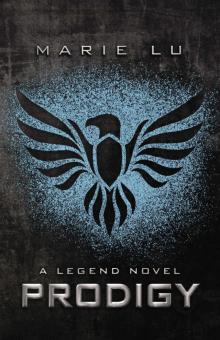 Prodigy
Prodigy Life Before Legend
Life Before Legend Legend Trilogy Boxed Set
Legend Trilogy Boxed Set Life Before Legend: Stories of the Criminal and the Prodigy
Life Before Legend: Stories of the Criminal and the Prodigy Wildcard
Wildcard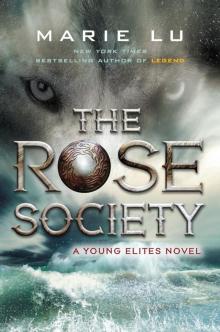 The Rose Society
The Rose Society Warcross
Warcross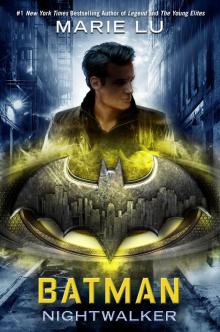 Batman: Nightwalker
Batman: Nightwalker Skyhunter
Skyhunter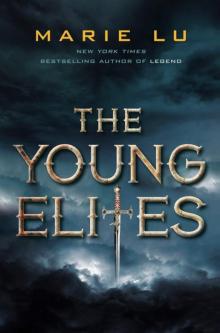 The Young Elites
The Young Elites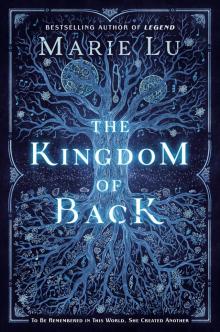 The Kingdom of Back
The Kingdom of Back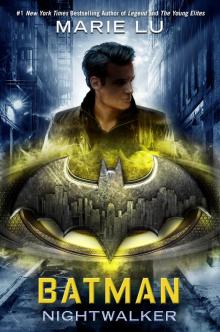 Batman
Batman Champion: A Legend Novel
Champion: A Legend Novel Wildcard (Warcross)
Wildcard (Warcross)